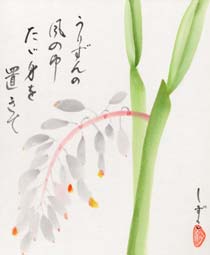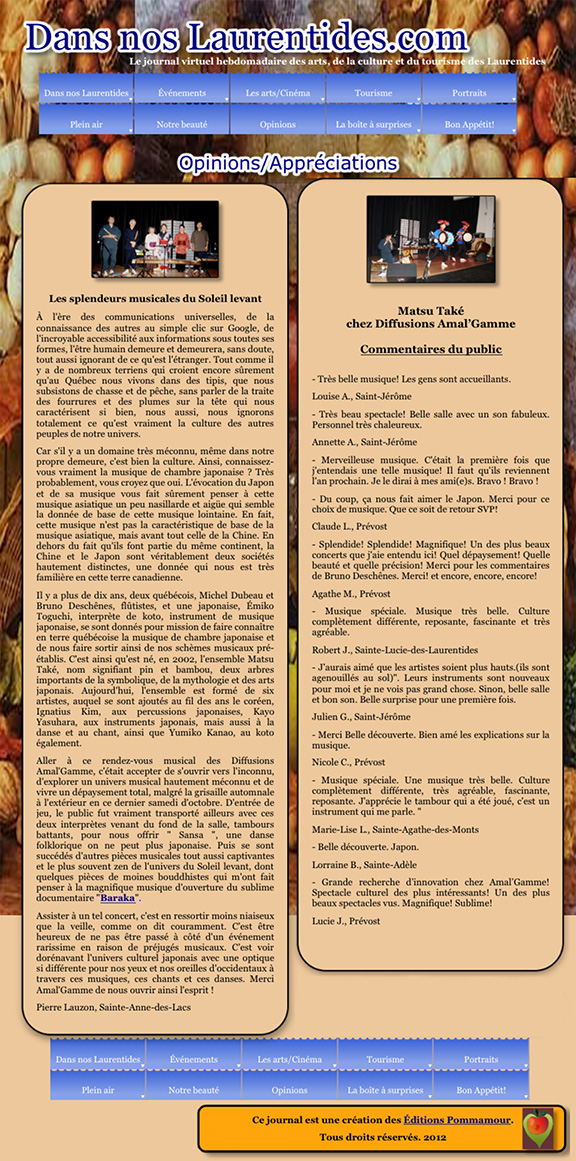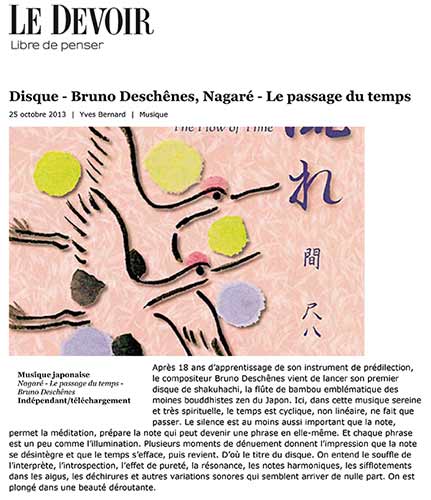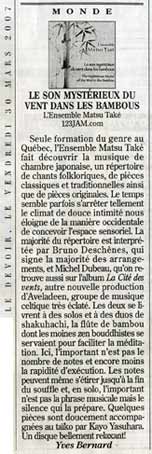
Fifth book by Bruno Deschênes, in English this time
Transmusicality, Mastering a Music from Another Culture, Croatian Musicological Society, Zagreb, 2022
Among the most debated issues in regard to the world music phenomenon, we read about identity, authenticity, hybridity, bimusicality, orientalism, exoticism, appropriation, among many other related issues. However, not much is said in these studies about the individual musicians themselves, about how and why one wants to become a musician performing world music, as well as what is involved in such personal endeavour, as much in regard to individuality, identity and authenticity in particular. In this book, Bruno Deschênes, a Canadian musician, having received his master title as a Japanese shakuhachi player, takes a personal, anthropological, ethnomusicological, philosophical and critical look at what it means to be a world musician, in particular, to master, if at all possible, a music from a culture in which one is not born. He calls this process transmusicality, by which a musician crosses over one’s native musical boundaries to play the music of another culture. To give a voice to these musicians, he interviewed seven musicians from different musical backgrounds, to get their personal perspectives on transmusicality and world music.
The first chapter briefly articulates the core concept of Bruno Deschênes’ argument: transculturality. More specifically, he suggests the notion of “transpropriation” as a possible antonym for “appropriation.” In the second chapter, the author compares transmusicality to bi-musicality, as put forth by Mantle Hood in the 1960s; a term which no longer applies to today’s world of music. The following chapter discusses identity. Through the lens of transmusicality, identity is interpreted as a “cloak” a musician dons to express his mastering of another music. The fourth chapter challenges the notion of authenticity. In the next chapter, questions of orientalism, exoticism and essentialism in world music, via the example of the Japanese shakuhachi, are examined. In the final chapter, the author interviews 7 musicians he considers to be transmusical. Despite its grounding in anthropological, ethnomusicological and philosophical debate, this book is written from the viewpoint of a musician attempting to understand what it means to perform a music from another culture.
It is available by contacting directly Bruno Deschênes at bruno@musis.ca.
* * * * * * * *
Fourth book by Bruno Deschênes
L'écoute de la musique à l'esprit, Conformité, socialité et historicité, Éditions L'Harmattan, Paris, 2021
(Music Listening in the Mind)
In French. In October 2021, the Éditions L'Harmattan in Paris released Bruno Deschênes' third book: L'écoute de la musique à l'esprit, Conformité, socialité et historicité (Music Listenign in the Mind). This book raises three important questions: Can we enjoy listening to a music that is out of tune? Do we really listen to music? Can we recount the stories of our listenings? The first question concerns the European tempered scale that is imposed on all musics of our world. The second relates to the sociology of music, in particular the relationship between musicians and music lovers. The third touches on the narrativity and historicity of our listening, made possible thanks to the recording from which we can listen to a music or a musicians numerous times, from childhood to old age. We have stories of the musics we listen to.
It is available on the following web site: http://www.editions-harmattan.fr.
* * * * * * * *
Third book by Bruno Deschênes
Les modalités de la conscience, Éditions L'Harmattan, Paris, 2020
(Modalities of Consciousness)
In French. In October 2020, the Éditions L'Harmattan in Paris released Bruno Deschênes' third book: Les modalités de la conscience (Modalities of Consciousness). In this book, hoping to gridge Japanese and European philosophies, the author proposes the notion of modality of consciousness, which he defines as the expressive and relational forms of our experience of the present moment. They reconcile the existential and innate link of our interiority with the exteriority of the world..
It is available on the following web site: http://www.editions-harmattan.fr.
* * * * * * * *
Second book by Bruno DeschênesUne philosophie de l'écoute musicale, Éditions L'Harmattan, Paris, 2018
(A Philosophy of Musical Listening)
In French. In October 2018, the Éditions L'Harmattan in Paris released Bruno Deschênes' second book: Une philosophie the l'écoute musicale (A Philosophy of Musical Listening). In this second book, he brings together the European philosophy of aesthetic and the Japanese traditional aesthetic, in the hope to discover how the Japanese sense of aesthetic could help us deepen our enjoyment of all music.
It is available on the following web site: http://www.editions-harmattan.fr.
* * * * * * * *
New solo CD by Bruno Deschênes: HIBIKI, Resonance
Released on October 12, 2017
Available on: iTunes.com, Amazon MP3, CDBaby.com
Bruno Deschênes released a new solo CD on shakuhachi. It is available on iTunes.com, Amazon MP3 and CDBaby.com. The CD offers 10 pieces, 6 from different Japanese repertoires, while the 4 other are his own original pieces. One is solo, two are in duo and the last one is in trio.
* * * * * * * *
 The Matsu Take Ensemble CD
The Matsu Take Ensemble CD
Released by ARC Music, U.K.
The 2016 CD of the Matsu Take Ensemble, Yamabiko, Mountain Echo, will be released internationally by the label ARC Music from U.K., on June 30, 2017.
* * * * * * * *
New book by Bruno Deschênes on the shakuhachi
Le shakuhachi japonais, Une tradition réinventée, Éditions L'Harmattan, Paris
(The Japanese Shakuhachi, A Reinvented Tradition)
In French. Bruno Deschênes has published a book in French on the shakuhachi. This book is the first in French entirely dedicated to the shakuhachi. Although ethnomusicological, it has been written from the point of the musician, looking in particular at how that musical instrument has been reinvented for our modern era.
It is available at the following Web site (in French): http://www.editions-harmattan.fr
* * * * * * * *
Concert by Michel Dubeau and Bruno Deschênes in Vancouver
They received their shihan
On Saturday 27, 2016, Michel Dubeau and Bruno Deschênes gave a concert alongside Alcvin Ryuzen Ramos in Sechelt, a small town north of Vancouver. For the occasion, Alcvin Ruyzen Ramos awarded to both of them their shihan, their master title in shakuhachi.
* * * * * * * *
Michel Dubeau and Bruno Deschênes attend a shakuhachi making workshop in Vancouver
Following up on their trip to Japan in November of 2015, Michel Dubeau and Bruno Deschênes attended on August 27 and 28 a shakuhachi making workshop with Alcvin Ruyzen Ramos, so they could make their own shakuhachi. Their understanding of honkyoku and shakuhachi was greatly deepened by learning how to make with one's hand such a beautiful flute.
* * * * * * * *
Dans nos Laurentides Web site, critic of October 26, 2013 concert by the Matsu Take Ensemble. (In French only.)

* * * * * * * *
Le Devoir newspaper, Montréal, October 25, 2013.
Critic of Nagaré by Bruno Deschênes

* * * * * * * *
September 2013. Bruno Deschênes releases his first solo CD on the shakuhachi
Bruno Deschênes has released in September 2013 a first solo CD on shakuhachi. He presents pieces from the honkyoku repertoire, the repertoire solo for shakuhachi. He presents also an original piece he wrote in the spirit of the meditative pieces, as well as an arrangement for 2 shakuhachi of one of the most beautiful piece for shakuhachi: Tsuru no sugomori, Nesting Cranes. This piece is traditionnally performed solo. Bruno Deschênes performs both parts.
This CD is available on iTunes.com, amazon.com, CDBaby.com and Bandcamp.com.
You can also hear it all on SoundCloud.com or Ethnocloud.com.
* * * * * * * *
Bruno Deschênes publishes an article on the Internet
In the last issue of Canadian Folk Music, vol., no. 4 (2013), you can read an article by Bruno Deschênes on the learning of the shakuhachi. The article is in French.
Please, visit the following link to read it: http://www.canfolkmusic.ca/index.php/cfmb/issue/current/showToc.
* * * * * * * *
The Matsu Take Ensemble on the Web
Come and hear us at the following Web sites:
* * * * * * * *
The Matsu Take Ensemble launch its first CD
on March 12, 2007, in Montréal
Produced by Québec label 123jam.com
On March 2007, the Matsu Take Ensemble will launch its first CD. You will hear on this CD, titled The Mysterious Sound of the Wind in the Bamboo, Michel Dubeau and Bruno Deschênes on shakuhachi. They present shakuhachi solos and duets. They are accompagnied by Kayo Yasuhara on taiko (a Japanese drum) in 2 Japanese folk songs. Emiko Toguchi presents an improvisation on koto with Michel Dubeau playing the shinobue, a small Japanese bamboo transverse flute. You will hear folk songs, classical pieces, original pices by Michel Dubeau and Bruno Deschênes. Most of the duets are arrangement by Bruno Deschênes.
You can buy the CD by visiting the following web site: www.123jam.com.
* * * * * * * *
Critics of our CD, in Montreal's Le Devoir, Friday, March 30, 2007
by Yves Bernard
 Here is a first critics of our CD by Montreal's Le Devoir critic yves Bernard, published Friday, March 30, 2007.
Here is a first critics of our CD by Montreal's Le Devoir critic yves Bernard, published Friday, March 30, 2007.
Unfortunately, it is only in French.
* * * * * * *
Technical Needs
In the "Instruments" menu, a new page on our technical needs for those who would like to book us.

